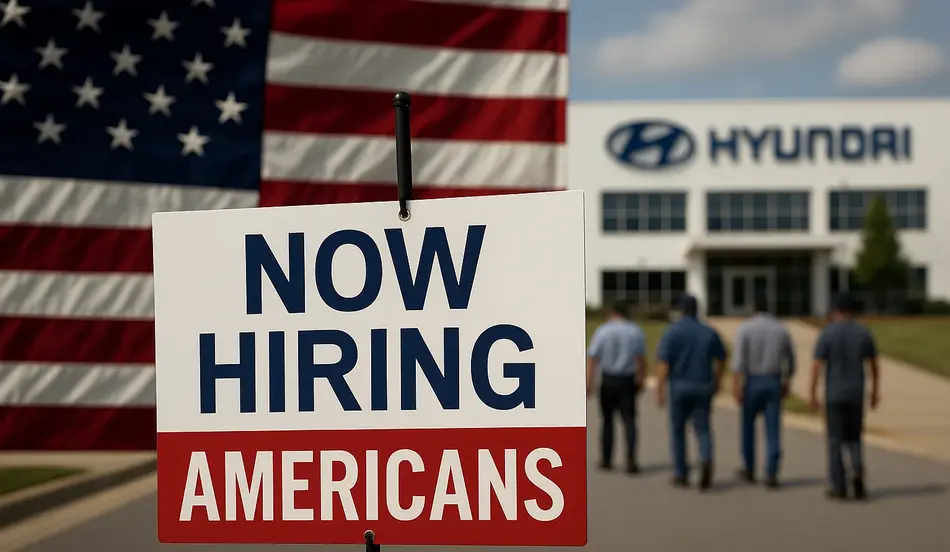In what officials are calling the largest workplace enforcement action in U.S. history, federal agents conducted a sweeping Hyundai ICE raid at the Hyundai–LG battery plant in Georgia, detaining hundreds of foreign workers, many of them South Korean nationals on temporary assignments.
In the aftermath, President Trump declared that foreign companies operating in the United States must “hire and train American workers” if they want to avoid scrutiny. The statement has sparked heated debate—raising questions about workforce readiness, immigration policy, and America’s ability to compete in the global supply chain.
The Raid: What Happened
- Location: Hyundai–LG battery plant, Georgia.
- Scale: Described as the single largest ICE worksite raid in U.S. history.
- Detentions: Hundreds of Korean workers were taken into custody for allegedly working without proper visas.
- Skills Gap: Attorneys for Hyundai workers argue they were brought in for short-term roles requiring specialized training unavailable in the U.S.
The raid disrupted operations at a facility critical to America’s electric vehicle (EV) supply chain.
Trump’s Message: Train Americans First
In a post-raid statement, President Trump struck a dual tone:
- Welcoming Investment: He emphasized that foreign companies are welcome in America if they follow the rules.
- Workforce Demands: He insisted that firms must invest in hiring and training U.S. workers before turning to foreign labor.
- Immigration Pledges: He suggested new, expedited legal pathways for highly skilled foreign workers—but only if companies make meaningful commitments to American workforce development.
The message was clear: foreign firms cannot treat the U.S. as a site for importing labor wholesale.
Diplomatic Fallout
The raid rattled relations with South Korea:
- Seoul officials expressed concern about the treatment of detained workers, noting that many were highly trained specialists essential for plant operations.
- Negotiations are underway to secure their return, with the issue rising to the level of trade diplomacy.
- South Korean firms are reconsidering expansion plans, worried about compliance risks and political instability.
Economic Stakes
The Hyundai–LG plant is part of the U.S.’s strategic push to dominate EV battery manufacturing:
- Billions in investment: The facility represents one of the largest Korean corporate investments in the U.S.
- Jobs at risk: Beyond the detained workers, American jobs tied to supply chains and construction could be affected if operations stall.
- EV competition: Any slowdown could jeopardize U.S. competitiveness against China in the global EV race.
Protect Your Workforce Strategy
With events like the Hyundai ICE Raid putting jobs and supply chains at risk, smart hiring has never been more critical. Post your job on WhatJobs and connect with reliable talent today.
Post a Job Now →Labor Market Implications
The raid raises pressing questions for employers and workers:
- Can American Workers Fill the Gap?
Critics argue the U.S. lacks enough skilled labor in specialized battery manufacturing to replace detained foreign staff quickly. - Training Timelines
Even if Americans are hired, training them for complex roles could take months or years. - Recruitment Strategies
Foreign firms may be forced to set up large-scale apprenticeship programs in partnership with U.S. colleges and trade schools.
Critics vs. Supporters
- Critics say the move risks undermining foreign investment, slowing innovation, and jeopardizing thousands of American jobs tied to global firms.
- Supporters argue that prioritizing U.S. workers strengthens sovereignty, reduces reliance on foreign talent, and ensures compliance with labor laws.
A Georgia union leader put it this way: “For too long, we’ve seen billions in investment come here, but not the jobs promised to Americans. If this forces companies to keep their word, it’s overdue.”
FAQs
Q1: Why did ICE raid the Hyundai plant?
Because hundreds of foreign workers were allegedly employed without proper visas.
Q2: Why were the foreign workers there?
Hyundai says they were specialists brought in for short-term assignments requiring expertise not available locally.
Q3: What does Trump want foreign companies to do?
Prioritize hiring and training American workers before relying on foreign labor.
Q4: What does this mean for U.S. workers?
It could lead to more training programs and apprenticeships, but in the short term, production disruptions may hurt jobs linked to the supply chain.
EV Battery Training in Tennessee
The situation echoes efforts at Ford’s BlueOval City project in Tennessee, another massive EV battery initiative.
- Instead of relying heavily on foreign technicians, Ford partnered with local community colleges to train thousands of workers in advanced manufacturing.
- Programs include six-month apprenticeships in battery assembly and quality control.
- The initiative has already placed hundreds of graduates into high-paying jobs, proving that domestic training can work if companies invest in it.
This serves as a real-world example of the model Trump is demanding: foreign investment tied directly to American workforce development.




